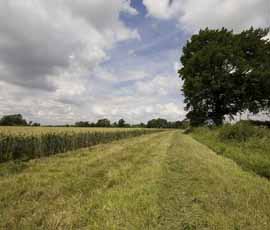Trade-offs required to provide food security

Environmentalists must recognise they can’t have it all their own way as farming must become more sustainable to meet the challenge of food security, a conference was told.
About 100 key industry leaders came together to debate “Trade-offs and synergies: working together to balance challenges and opportunities in UK farming” – a multi-partner project which aims to identify the challenges, priorities and trade-offs required to “meet the challenge of the increased for producing food over the next 30 years in a sustainable manner”.
The conference, a Linking Environment And Farming (LEAF) event which debated the subject at Syngenta’s offices in Jealott’s Hill, Bracknell, on Thursday, 1 March, was chaired by BBC Countryfile presenter Tom Heap. It heard presentations from experts on food security and farming leaders, the key ideas and themes of which were recorded simultaneously by artists from Visual Minutes.
Speaking at the conference, Tim Benton, UK champion for global food security, identified the biggest trade-off for farming was for it “to become more sustainable”, but environmentalism had to recognise that “it can’t have it all”.
Prof Benton, of Leeds University, told delegates that to meet the challenges, farmers would need to increase food production while minimising inputs and enhancing ecosystems.
Balancing the cost and benefits of agricultural practices against the environment would be a key part of this, he said,
Some options could include:
• Changing the way we view food – for some crops as little as 40% that is grown is eaten
• Reducing the “awful” figures that show about 30% of food produced in the UK is wasted
• A reduction in the use of artificial nitrogen fertilisers to benefit the oceans, biodiversity, water and air quality and human health
• Greater water abstraction rights for farmers, especially those in drought-hit areas such as south-east England
• Maintaining crop margins to attract natural predators of aphids, such as small wasps
• More research into soils to increase soil fertility and manage soils for production
• Reducing wasteful crop inputs through precision agriculture, such as no-till and low-input systems
Prof Benton said a better trade-off was needed between land used for production and land set aside for biodiversity.
“In different landscapes you need to do different things and agri-environment schemes have not really taken this into account,” he said.
In some landscapes, intensive farming makes sense, but others work better if some areas are set aside specifically to nature, he added.
“We might care about the skylarks in the fields outside. But if we preserve those and we don’t grow as much food, then someone somewhere else will have to grow that food,” Prof Benton warned.
Michael Winter, a rural policy specialist and food security expert at Exeter University, said the country had seen a food revolution in recent years, which has served to reconnect farmers and consumers at many levels.
However, his biggest concern over the food security challenge was that ecosystems would lose out to “rampant market-driven productivism” in agriculture.
“We have to get the balance right,” said Prof Winter. “I would consider trading some production for wider ecosystem services because well-being is not about living by bread alone.”
But he added: “We must reward farmers and landowners and providers of these (environmental) services in some ways – and this is the big challenge.”
Prof Winter said the greatest opportunity for farmers was to “view themselves as providers of services as well as commodities, thereby reinstating farming’s social purpose and its centrality in society”.
NFU president Peter Kendall said studies had shown that the UK population would jump from 62m to as much as 70m in the next 30 years.
“Sustainable intensification is what Caroline Drummond and LEAF have been challenging farmers to do for a long time,” he said.
“We are going to have to produce more at a time when energy costs are rising, natural resources which provide the nutrients we need to manage our farms are diminishing and water equation is being highlighted at this time.”
Mr Kendall then told of some practical methods he was looking at introducing on his farm in Eyeworth, east Bedfordshire, to meet the challenges.
“I have got to hedge against energy costs going up and that’s why I’m trying to convince my brother into having a couple of small wind turbines, maybe 25m to 30m in size,” he said.
“We are also looking at electrical tractors and moving all our diesel engines into electric ones.
“We would become more efficient and if we can do it with turbines and solar panels we will become more integrated and sustainable for the long run.”
Mr Kendall said adopting more integrated farming systems would be important to meet the challenge of sustainable intensification.
In his case, better use of nutrients and devices to eliminate soil compaction would be needed for his arable farming.
Mr Kendall said he was also considering introducing a mixed farming system, either through pigs or poultry, on his farm.
“When you look at the pig sector, 40% of our own pork is produced in the UK, which is a fantastic opportunity,” he said.
“If I could have my own pig unit on my farm producing a hedge for the grain I produce and then having all that manure back on the farm, integrating into a renewal energy system, what an opportunity it would be.”
After the presentations, delegates were split into groups to identify priorities and trade-offs for practical solutions across the food chain.
In between, a Question Time-type session prompted a lively debate on the moral dilemma that farming faces over the next 30 years.
* Trade-offs and Synergies: working together to balance challenges and opportunities in UK farming is a collaboration between Linking Environment and Farming (LEAF), the UK Food Chain Alliance (UKFCA) and Knowledge Transfer Network, the Biotechnology and Biological Sciences Research Council (BBSRC) and the National Environment Research Council (NERC), Syngenta, McCain, ASDA, Velcourt and Volac.

